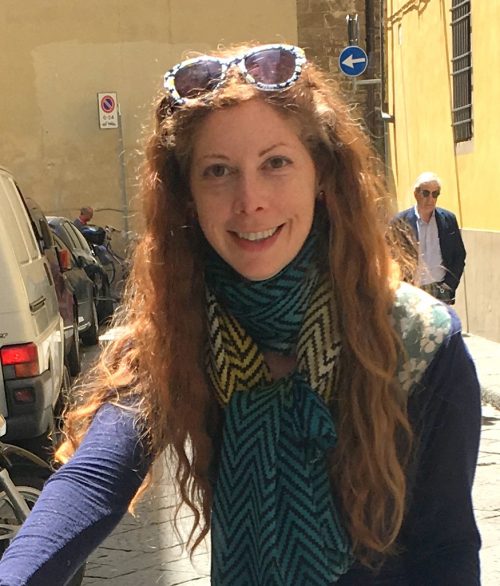 Diamanta in the English Cemetery, Piazzale Donatello, Florence.
Diamanta in the English Cemetery, Piazzale Donatello, Florence.
.
It’s almost 11:30 at night here. I just walked into my apartment and turned on the TV to find Philadelphia Story dubbed in Italian, which is pretty entertaining. I’ve been in Venice all day, which sounds lovely, and I’m probably just getting spoiled from my Italian adventures, but I found it gloomy and alien and too self-consciously beautiful.
So I really don’t write much these days. Most of the time, I’m with the students, escorting them from museum to train station, worrying about their homesickness, their illnesses, their inability to use paper maps. They are incapable of functioning without constant cell phone use but equally incapable of operating their Italian cell phones.
 Elizabeth Barrett Browning’s grave.
Elizabeth Barrett Browning’s grave.
When I am alone, I am afflicted with restlessness and I wander around the streets, rather than writing diligently. I visit Sister Julia, a British nun who lives in a tiny apartment in the archway over the English cemetery (where Elizabeth Barrett Browning is buried, among others) and I try to converse, in my truly terrible Italian, with the Roma who gather there. I understand more than I can communicate. Their lives are dramatic, on the edge. Desperation, tears, and wailing. They are also amazingly international. They travel back and forth to Romania frequently–I don’t understand where they get the money for bus fare. A good day of begging yields about ten euros.
 Sister Julia in the English Cemetery.
Sister Julia in the English Cemetery.
There is a young Roma man named Mihai who can probably speak the best English. He is somewhat of a visionary, I think. He is about twenty, but has been married since he was fourteen and already has three children. He is resolutely against such young marriages, as he says it’s too hard on the women’s bodies. He wants to start a school for Roma children in his village in Romania. Roma parents rarely send their children to the regular school. I’ve heard a variety of reasons—they prefer single-sex education, they don’t want the girls to wear the uniform slacks, and the books and clothes are too expensive. Mainly they worry that the Gadjo (non-Roma) teachers will be cruel to their children.
Mihai, as well as his twin brother George (the two warrior saints, they both told me proudly—Michael and George) his older brother Ionel, and Ionel’s wife Diamanta, work diligently on their alphabet sheets under the archway of the English cemetery. Sister Julia has created these xeroxed worksheets for them with spaces to copy out the Lord’s Prayer in Latin, along with their names and ages.
 From left to right: Mihai, Sister Julia, Ionel, Laura Michele Diener, and Diamanta eating under the arch at the English Cemetery in Florence.
From left to right: Mihai, Sister Julia, Ionel, Laura Michele Diener, and Diamanta eating under the arch at the English Cemetery in Florence.
One of the women who is on the fringes of this group, Jova, begs at the Ospedale del’ Innocenti, where many of them sleep at night. She is a cousin of the core family. Mihai calls her, his familia, but seems confused about how she is actually related. Jova resembles most of the old beggar women in Europe–wizened. tiny, and brightly clad. She shakes a tiny cup and I can’t imagine she gets very much. Apparently, though, she has a college degree and is one of the only Roma I’ve met who is actually literate. She begs for the money to pay off the debt for her husband’s funeral. Although, like all the Roma I’ve met, she is hazy about dates and times, she remembers the concentration camp in Transnistria from her childhood.
Maria, her daughter, is the most aggressive of the Roma, and the only one that actually frightens me. If I caught her alone at night, I feel sure she would have no qualms about robbing me or possibly slitting my throat. Whenever she sees me, she comes running, calling out, “Amica, amica,” and kisses me, and then immediately demands money. I haven’t given her any in weeks, but she never gives up. At Mihai’s suggestion I’ve started carrying bags of rolls or peaches to offer her instead, and she gets angry and refuses to take one. Then she comes running after me and demands the entire bag. If I only give her one, she breaks it in half and then throws it away. Although she is Jova’s daughter, she is completely illiterate–apparently, her father forbade her to learn. I imagine she has had a very difficult life.
—Laura Michele Diener
.

Laura Michele Diener teaches medieval history and women’s studies at Marshall University in Huntington, West Virginia. She received her PhD in history from The Ohio State University and has studied at Vassar College, Newnham College, Cambridge, and most recently, Vermont College of Fine Arts. Her creative writing has appeared in The Catholic Worker, Lake Effect, Appalachian Heritage, and Cargo Literary Magazine, and she is a regular contributor to Yes! Magazine.
.
.
Great letter, LM! You inspire me to be a traveler in the best sense of the word. Congrats on the publication — Ciao!
Thank you, Anne! Can’t wait to see you and share more adventures soon!